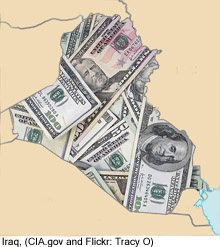U.S. War Privatization Results in Billions Lost in Fraud, Waste and Abuse–Report

At a hearing in Washington today, the federal Commission on Wartime Contracting in Iraq and Afghanistan is releasing a 111-page report that represents its “initial investigations of the nation’s heavy reliance on contractors.” According to a release on the hearing:
More than 240,000 contractor employees, about 80 percent of them foreign nationals, are working in Iraq and Afghanistan to support operations and projects of the U.S. military, the Department of State, and the U.S. Agency for International Development. Contractor employees outnumber U.S. troops in the region. While contractors provide vital services, the Commission believes their use has also entailed billions of dollars lost to waste, fraud, and abuse due to inadequate planning, poor contract drafting, limited competition, understaffed oversight functions, and other problems.
These statistics support a recent DoD report on the extent of the US reliance on contractors. That report also found that there has been a 23% increase in the number of “Private Security Contractors” working for the Department of Defense in Iraq in the second quarter of 2009 and a 29% increase in Afghanistan, which “correlates to the build up of forces” in the country. In Iraq, the Pentagon attributes the increase to better accounting. There are currently more private contractors (counting both armed and unarmed) in Afghanistan (68,197) than US troops (40,000). In Iraq, the number of contractors (132,610) is basically equal to the number of US troops.
(NOTE: I recently discussed this issue on Bill Moyers Journal)
The single greatest beneficiary of the US wars in Iraq and Afghanistan is KBR, the former Halliburton subsidiary. KBR has been paid nearly $32 billion since 2001. In May, April Stephenson, director of the Defense Contract Audit Agency, testified that KBR was linked to “the vast majority” of war-zone fraud cases and a majority of the $13 billion in “questioned” or “unsupported” costs. According to Agency, it sent the inspector general “a total of 32 cases of suspected overbilling, bribery and other violations since 2004.”
According to the Associated Press, which obtained an early copy of the commission’s report, “billions of dollars” of the total paid to KBR “ended up wasted due to poorly defined work orders, inadequate oversight and contractor inefficiencies.”
KBR is at the center of a lethal scandal involving the electrocution deaths of more than a dozen US soldiers, allegedly as a result of faulty electrical work done by the company. The DoD paid KBR more than $80 million in bonuses for the very work that resulted in the electrocution deaths.
Among the other scandals involving KBR that the commission is investigating is a questionable contract to rebuild a large dining facility at Camp Delta in Iraq:
In July 2008, the Army said a new dining facility was badly needed at the Camp Delta forward operating base because the existing one was too small, had a saggy ceiling, poor lighting and an unsanitary wooden floor.
KBR was awarded a contract in September. Work began in late October as American and Iraqi officials negotiated the agreement setting the dates for the U.S. troop withdrawal.
But during an April visit to Camp Delta, the commission learned that the existing mess hall had just been renovated. The $3.36 million job was done by KBR and completed in June 2008. Commission staff toured the renovated hall “without seeing or hearing of any problems or shortfalls,” the report says.
Here’s the kicker:
The decision to push ahead with the new hall was based on paperwork that was never updated and a failure to review the need for the project after the security agreement was signed. Most of the materials have been ordered and construction is well under way. That means canceling the project would save little money because KBR would have a legitimate claim for payment based on the investment it has already made.
So, are all these investigations and scandals hurting KBR? Apparently not:
Today, neither Halliburton nor KBR are suffering from their divorce. Halliburton reported $4 billion in operating profits in 2008, while KBR recently said its first quarter revenues in 2009 were up 27%, for a total of $3.2 billion. Its sales in 2008 were up 33%, and according to the Financial Times, the company had $1 billion in cash, no debt, and was looking for acquisitions.
One last note for context: While the Wartime Contracting Commission is doing very important work revealing the scope of the corruption, shoddy work and abuses within this system, it also includes several members who are either pro-war or have worked for major war contractors. This is the composition of the commissioners:
Co-chair Michael J. Thibault, a former deputy director of the Defense Contract Audit Agency, was appointed by Senate Majority Leader Harry Reid and House Speaker Nancy Pelosi. Former Republican Congressman Co-Chair Shays was appointed by House Minority Leader John Boehner. The other six commissioners are Clark Kent Ervin, Grant S. Green, Linda J. Gustitus, Robert J. Henke, Charles Tiefer, and Dov S. Zakheim.

